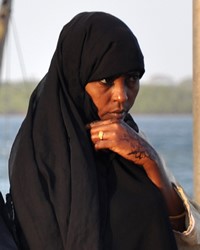Swahili in Greece

Photo Source:
Luciano Rizzello - Flickr
Creative Commons
|
Send Joshua Project a map of this people group.
|
| People Name: | Swahili |
| Country: | Greece |
| 10/40 Window: | No |
| Population: | 5,500 |
| World Population: | 1,196,000 |
| Primary Language: | Swahili |
| Primary Religion: | Islam |
| Christian Adherents: | 5.00 % |
| Evangelicals: | 0.30 % |
| Scripture: | Complete Bible |
| Ministry Resources: | Yes |
| Jesus Film: | Yes |
| Audio Recordings: | Yes |
| People Cluster: | Bantu, Swahili |
| Affinity Bloc: | Sub-Saharan Peoples |
| Progress Level: |
|
Introduction / History
The name Swahili literally means "coast," and is the name given to several people groups that share a common culture (Uswahili), language (Kiswahili), and religion (Islam). Thousands of years ago, groups of hunters inhabited the East African coast and intermarried with the Cushite shepherds there. By the second century, Bantu-speaking people from Northern Congo came to the area and intermarried with them. Subsequent groups of people migrating from other areas such as the Persian Gulf also joined these coastal people, adopting parts of their culture and language. Later, Indonesian, Hindi and Portuguese traders settled on the coast. Soon, they too began adopting Swahili traits and became a part of the larger group. Since that time, groups of Swahili have migrated to different parts of the coast, forming their own dialects and cultural variations. The Swahili language has many different dialects. A number of its words were borrowed from Arabic, the second language for many Swahili. More recently, Africans have come to Greece and other countries in Europe seeking for work, freedom, and a chance to start anew.
Today, the Swahili are scattered along Eastern Africa and the Persian Gulf, from Saudi Arabia to Zambia. Though they are called "Swahili" by others, they prefer to be named according to their local settlements. A small number lives in Greece.
What Are Their Lives Like?
African immigrants to Greece, including the Swahilis, are known as Afrogreeks. Since 2000, Swahili speakers have immigrated to Greece from East Africa. They have settled in three metropolitan areas, including Athens. Some are well-known athletes. Muslim or Christian, athlete or not, they fear racism. A Grecian political party convicted of leading a criminal organization is reported to have assaulted and harassed Afrogreeks.
They are often not accepted for a couple of reasons. These Africans usually are hoping to go to other countries, so they seldom try to learn Greek. In times of economic downturns Africans are viewed as threats to job security.
Africans definitely stand out in Greece. Gender roles are very different between post-modern Greeks and Muslim Africans like the Swahili.
What Are Their Beliefs?
Nearly all of the Swahili profess to be Muslims; however, they have kept many of their traditional pre-Islamic beliefs and practices. For example, they believe in many spirits - both good and evil. They also believe in the supernatural power of witches and sorcerers. Those who have moved to Western cities are more likely to adhere to traditional Islam rather than African religion.
What Are Their Needs?
Although Christian resources are available in the Swahili language, there are only a small number of Swahili believers. There is a great need for laborers who are sensitive to their Muslim culture. Greece has religious freedom, so it would be especially easy for someone to reach them there. Who will do it?
Prayer Points
Pray for his kingdom to come and his will to be done among the Muslim Swahili people in Greece.
Pray for a movement of Swahili households to study the Bible and accept the blessings of Christ.
Pray for workers who are filled with the fruit and the power of the Holy Spirit to go to the Swahili people.
Pray for a spiritual hunger that will drive a movement of the entire Swahili people to become his ambassadors in Greece.